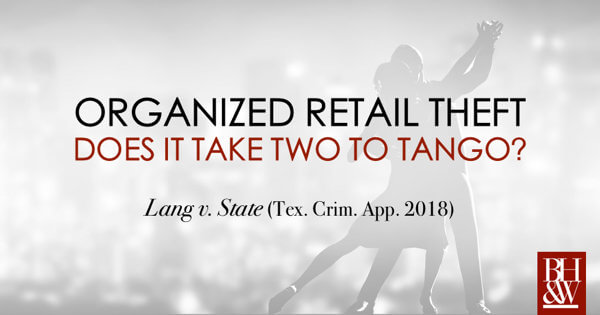 The Court of Criminal Appeals recently handed down a case regarding a police officer’s findings of reasonable suspicion and probable cause. The issue was whether an officer had probable cause to arrest a customer for theft from a store before she actually exited the store and when she claimed, after being confronted by the officer, that she was going to pay for the items shad had placed in her purse.
The Court of Criminal Appeals recently handed down a case regarding a police officer’s findings of reasonable suspicion and probable cause. The issue was whether an officer had probable cause to arrest a customer for theft from a store before she actually exited the store and when she claimed, after being confronted by the officer, that she was going to pay for the items shad had placed in her purse.
State v. Ford, Court of Criminal Appeals (2017)
The Facts—What Happened?
A Corpus Christi Police Department Officer responded to a report regarding a customer in a Dollar General Store concealing store merchandise in her purse and jacket. Upon arriving at the store, the responding officer met with the employee and was given a description of the customer.
The police officer approached a customer matching the employee’s description, identified later as Ford, and informed her that she had been seen concealing merchandise in her purse. Ford replied that she was not done shopping and had intended to pay for the items. However, the officer noticed that Ford had a shopping cart with store items that were not in her purse. The purse was covered by a jacket, which the officer picked up, and discovered that the purse was fully zipped up and full of merchandise. Upon removing the store items from her purse, the officer discovered six small baggies of methamphetamine and two pills.
The State charged Ford with theft over $50 and possession of controlled substances. Ford was subsequently indicted for possession of methamphetamine.
Defendant’s Motion to Suppress—The Trial Court Granted Defendant’s Motion and Determined No Reasonable Suspicion or Probable Cause
The drugs found on the defendant were discovered during a theft investigation. The defendant filed a motion to suppress the drugs. The trial court granted the motion to suppress.
At the suppression hearing, the trial court acknowledged that a theft could be complete without the physical removal of the property; however, the court also observed that the defendant never tried to leave the store with the merchandise and “was still shopping.” Further, the court determined that there was insufficient evidence that the defendant intended to steal the merchandise because she did not attempt to leave the store, she did not run or try to conceal anything when approached by the officer, and she stated that she intended to pay for the merchandise.
The trial court concluded that the “officer acted prematurely” in approaching the defendant and asking questions about the merchandise and that inferring an intent to steal was “too big a leap at [that] point.” The trail court questioned the reliability of the information provided during the suppression hearing as it all came from reports by the store employee and the police officer, both of whom were not at the suppression hearing to substantiate the information.
The Court of Appeals Agreed with the Defendant and the State—Holding that the Officer Had Reasonable Suspicion, but Not Probable Cause
On appeal, the State argued that the conversation between the police officer and the defendant was part of a consensual encounter and that the totality of the circumstances gave rise to probable cause to arrest the defendant.
The court of appeals rejected the State’s first claim that the conversation was part of a consensual encounter, but agreed with the State that the police officer had reasonable suspicion to stop the defendant to ask her questions. The court of appeals held that the trial court erred in concluding that the officer lacked reasonable suspicion to conduct a stop.
The court of appeals held that the trial court was within its discretion when it concluded that the State failed to meet its burden of proof establishing probable cause to arrest. This discretion was used when determining that the evidence used by the State was “questionable” with no one able to corroborate the information provided.
The Court of Criminal Appeals Reversed the COA Judgment and Determined that an Officer has Probable Cause to Arrest for Theft Even Before the Defendant Exits the Store
The Court of Criminal Appeals recognized that both the trial court and the court of appeals recognized that it was not necessary for the defendant to take the merchandise out of the store for her to commit theft. Nevertheless, both of the lower courts erred in concluding that the officer did not have probable cause to believe that the defendant intended to steal the items.
The court explained that the officer had knowledge of at least four undisputed facts supporting the idea that the defendant intended to steal: (1) the store employee reported that the defendant was concealing items in her purse; (2) the defendant admitted to the officer that she had concealed items in her purse; (3) the shopping cart had items from the store that were not in her purse; and (4) the defendant’s jacket was covering her purse. The fact that the defendant placed some items in her shopping cart but concealed others in her purse caused the arresting officer to believe the defendant was intending to steal the concealed items.
The court supported this argument by referring to Groomes v. United States, 155 A.2d 73, 75 (D.C. App. 1959), in which the District of Columbia Court of Appeals heard a case—similar to this one—and concluded that once items are removed from the shelf and concealed or put in a convenient place for removal, the elements of a taking and appropriation are satisfied. Further, the police officer could reasonably believe that the placement of the jacket on top of the bag was used to further conceal items.
The court also addressed the lower courts’ concern of reliability of the reports by the employee and the officer. The court notes that the employee’s report was then corroborated by the admission of the defendant, and further, that the employee served as a citizen informant who the officer could reasonably rely on as one of several factors for determining probable cause.
Here, the Court determined that the lower courts erred in concluding that the police officer lacked probable cause to arrest the defendant. Accordingly, the Court reversed the judgments of the courts below.










